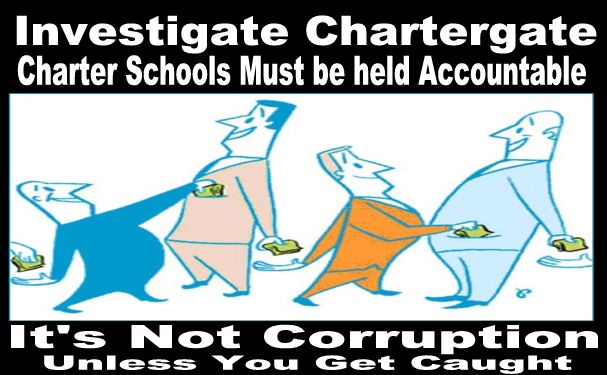Grand jury indicts company that led four Pinellas charter schools into financial peril | Tampa Bay Times:
Grand jury indicts company that led four Pinellas charter schools into financial peril
A company that has been criticized for poor financial management at four Pinellas County charter schools has been indicted by a north Florida grand jury on charges of grand theft, money laundering and aggravated white collar crime.
The counts allege criminal activity at three now-closed charter schools in Pensacola.
Criminal summons have been issued to Newpoint Education Partners and three related companies that also were indicted — School Warehouse, Red Ignition and Epiphany Management Group. According to records recently obtained by the Tampa Bay Times, the related companies have sold hundreds of thousands of dollars worth of classroom supplies and technology services to Newpoint-managed schools in Pinellas.
All four companies could face fines, revocation of their business charters and restrictions on their activities, and could be ordered to make restitution. No individuals responsible for the companies have been charged.
Newpoint also managed Newpoint Tampa High School in Valrico until 2013, when it closed due to multiple concerns, including finances.
The indictments were handed up Wednesday by a grand jury in the First Judicial Circuit of Florida in Escambia County, but not released until Thursday. State prosecutor Russell Edgar said the jury charged the companies with laundering money and fraudulently billing schools for supplies, equipment and services with federal start-up grant funds for charter schools.
Investigators began receiving complaints about grade-tampering, teacher misconduct and misappropriation of supplies last year. In June, the Florida Department of Education visited three now-closed Newpoint-run charter schools in Escambia County and found at least 80 items that were purchased with federal grant money awarded to schools in other districts, including Pinellas.
Twelve tables found at those schools were purchased with grant money from Newpoint schools in Pinellas. The state also visited Windsor Preparatory Academy and East Windsor Middle Academy in St. Petersburg as part of its inquiry.
Edgar said prosecutors are investigating related incidents in Pinellas county, where Newpoint has recently sowed chaos using public money. Although charter schools use tax dollars, they are privately run with limited oversight from school districts.
Newpoint has run into major problems at four of the five schools it manages in Pinellas — Windsor Prep and East Windsor Middle Academy in St. Petersburg and Newpoint Pinellas Academy and Newpoint Pinellas High in Clearwater. All four are under pressure to tell the Florida Department of Education how they plan to address their "deteriorating" finances, the description used by Pinellas school officials.
Altogether, the schools enroll more than 700 students and receive $4.5 million in public funding, but have a total debt of $1.8 million according to audits.
In recent weeks as parents and volunteer board members at each of the schools have started to raise questions, Newpoint officials have disappeared from the scene. No one at the schools or the school district has been able to reach them, leaving parents and others to sort out bank accounts and legal issues.
"My overall assessment of the situation is it's not a surprise because this is what we've known all along," said Chris Wenzel, a Windsor Prep parent who joined the board overseeing Windsor Prep, East Windsor and Newpoint Pinellas Academy. "Something fishy was going on."
Pinellas County Schools spokeswoman Lisa Wolf said the district's legal staff is reviewing the indictments and "will take the appropriate next steps."
Newpoint, which also does business in Ohio as Cambridge Management Group, had been headquartered in Clearwater. Its most recent president was Eileen Quinlan, however the founder of the company is Marcus Nelson May, who has ties to the related companies listed in the indictments.
Neither Quinlan nor May responded to requests for comment Thursday.
The state attorney's office in Escambia County recently had subpoenaed records from Pinellas and other Florida counties where Newpoint has managed schools.






